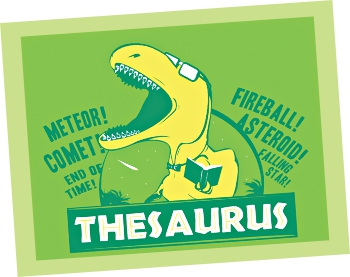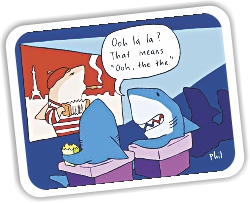A Way With Words
By Niladry Sabir
 We covet the absence of necessity, coercion, or constraint in our choices or actions.
We covet the absence of necessity, coercion, or constraint in our choices or actions.
Sounds nice, doesn't it?
We require the privilege of doing what we desire under our own will.
That sounds nice, too.
We want freedom.
Ladies and gentlemen, I would like to ask you: which one seems more appealing? Is it the first one, because it has fancy words in it? Or the second one, because it's long and reveals a lot more with easier vocabulary? Or do you prefer the last one, because it expresses so much…in just three words?
English language. Not the subject. The whole idea of the English language is to reveal a new dimension to us, a new form of communication which a lot of us have been learning since we were enrolled into school. Some of us were forced to converse only in that, while some of us were awed by anyone who could complete a sentence in one of those awesome accents that we adore.But the question here is: what kinds of words do we prefer? What inspires us? What would we rather read? A bunch of hard words? A well-thought sentence with a few good words?
Simplicity?
If you have lived in Bangladesh for quite some time, and have gone through many of the English exams as yours truly has, then you would understand one thing: The one with the big, bad, hard words really does get a lot of credit.
Fortunately for us all, though, the torture - or pleasure in some cases – lasts for only a little while. As we all grow up, the eyes of the teachers stop skimming through the essays for words that consist of more than six letters, and gradually, they actually start appreciating the simpler works. We all wish society thought that way, too, but knowing hard words only leads to people looking up to you more, right?
Wrong.
“It's not about how much Shakespearean you can speak; it's actually about the value of your words. And the simpler you speak, the more value it has,” says Ratul, owner of an A* in English Language in his O-levels. “The best way to make people look up to you is by the usage of your communication skills, negotiation skills, which can mostly be done through simple words.”
The whole idea behind using easier words is that everyone understands it. And if everyone understands it, it is much easier for you to get a point across, which can motivate people more. “Using hard words isn't going to inspire people. It's all about how much you can say in a short sentence, at the same time making sure people get you,” is the opinion of Abraham, the assistant of a class nine English teacher of a reputed school.
So, if people really do prefer to listen to what is easier to grasp, then where did the notion of having the necessity to know and use hard words come from? When asked, an eighth grader replied, “I use hard words to get more marks from my English teacher, if…you use it correctly.” Therefore, it seems that the place of learning is where the birth of this concept took place. To the author here, it only seems to be an excuse to get good marks.
Imagine the protestors at Projonmo Chhottor holding HUGE placards that screamed out, “We are clamoring for the termination of the monstrosity haunting our kinsfolk!”
Instead, what is written there is: “We want justice.”
Because, at the end of the day, it is simplicity that can inspire.
And if that is not enough motivation for someone to stop crawling over the need to use hard words…just hand them a play by Shakespeare.
The Gender in Words
By Mister Fantastic
The French have got at least something right by understanding that certain words are actually of the female gender while some are male. The Poles, too, have gone about and developed this idea. But it seems the English language is still lagging behind in this sector. Well uninformed readers, it is with pleasure that I tell you that there are some words which are in fact female, or rather best used by females while there are certain words which are best used by the males. Interchanging of such words is as annoying as a man in bangles. To clarify, do duly observe.
The word ginormous is apparently a cross between gigantic and enormous. Now, as idiotic as it sounds, the word has caught on and thus is now widely used in all contexts, even when not necessary. In all honesty, the word does tend to be funny, unless of course it is used by a female specimen. There are certain territories in the joke sector, which women should stay away from. Although we condone neither, racist and sexist jokes fall into such a category along with the word ginormous. Women just can't pull it off and it is clearly annoying when they do try. If you are a female, this word is just not for you. Stop using it.
 Secondly, there's that word 'much'. In normal circumstances this word is quite acceptable by both genders, but when a sarcastic accent is applied to it, it best be left to the females. In an attempt to be clever, many people say things such as 'obvious, much?', 'arrogant, much?' etc, etc. Now as retarded as it sounds, the addition of the word 'much', in the instances described, is actually frequently used, ending in high-fives. It's a really stupid thing to do, especially if you are a boy. Boy-sarcasm is different than girl-sarcasm and it should pretty much stay that away. If you are a boy, please do refrain from using this tedious bit of stupidity.
Secondly, there's that word 'much'. In normal circumstances this word is quite acceptable by both genders, but when a sarcastic accent is applied to it, it best be left to the females. In an attempt to be clever, many people say things such as 'obvious, much?', 'arrogant, much?' etc, etc. Now as retarded as it sounds, the addition of the word 'much', in the instances described, is actually frequently used, ending in high-fives. It's a really stupid thing to do, especially if you are a boy. Boy-sarcasm is different than girl-sarcasm and it should pretty much stay that away. If you are a boy, please do refrain from using this tedious bit of stupidity.
Moving on to the word 'epic'. As with most words, even this word has now lost its meaning. Nowadays everything is apparently epic. Whatever you do can be considered epic. Maddox pointed this phenomenon out, a while back, but here's an attempt to add a little more dimension to it. This four-letter word is, clearly, masculine. There is no way of going about it. A hattrick can be epic, a volley from the half-line can be epic, a car crash which one survives can also be epic, but a shade of nail-polish can never, ever be epic. It just cannot. And as we believe women usually talk about make-up and other materialistic words, let's just understand that they should never use the word epic. Otherwise it's criminal. Same goes for words such as 'dog', 'legen-(wait-for-it)-dary', 'bro', and also the phrase 'layeth the smacketh down'.
At the risk of being partial (again), let's add a few more words that should be taken off the Man Vocabulary. Petite is one of those words. Sun-screen, pinktastic, fluffy and jiffy are other words men should not use. The sounds 'aww' and 'ouch' are also two instances of female vocabulary, as men should a) not find things cute and b) never feel any hint of pain. Finally, there is also that female symbol 'xoxo' which men should not use along with the signatory good-bye word 'toodles'. If a man chooses to express or use either of those, then you have a serious problem. Get him a skirt if he persists.
The above were simple examples of how the English language is clearly lending a helping hand to some growing concerns in the world today. It is time we understood the problem and began by correcting it ourselves. So men, stay clear of words that sound too nice or comfortable and women, stay away from words that sound too awesome or masculine and for crying out loud, give us our pants BACK.
N.B: The writer seems to be highly opinionated and set in his ways. Yet, his pained attempts at masculinity failed when he was seen wearing pink jackets in secret.
